Conscience and Conviction – WWI school resources
2014
 Quaker Peace and Social Witness has produced two new resources for peace education: Conscience (primary school-focused) and Conviction (secondary school-focused).
Conviction can supplement existing lesson materials in subjects such as History, Religious Education or Citizenship, and be used to support the delivery of Personal Social Health Education (PSHE) or Spiritual Moral Social Cultural (SMSC) education.
Through engaging with speaking and listening activities in pairs and groups, children can discuss and reflect on historical source materials including documents, letters, posters and images.
Quaker Peace and Social Witness has produced two new resources for peace education: Conscience (primary school-focused) and Conviction (secondary school-focused).
Conviction can supplement existing lesson materials in subjects such as History, Religious Education or Citizenship, and be used to support the delivery of Personal Social Health Education (PSHE) or Spiritual Moral Social Cultural (SMSC) education.
Through engaging with speaking and listening activities in pairs and groups, children can discuss and reflect on historical source materials including documents, letters, posters and images.
Security for the future: In search of a new vision
May 2016
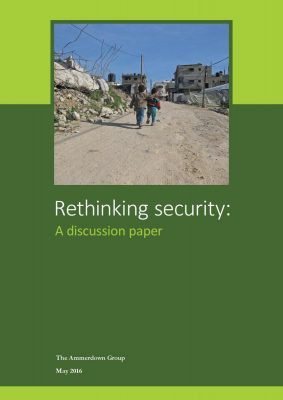 A group of UK peacebuilding professionals invite you to participate in a new civic conversation about alternatives to the current approach to national security. Here they outline their concerns about the existing model, and offer a different vision for the future, welcoming input from anyone who wishes to engage in this debate.
A group of UK peacebuilding professionals invite you to participate in a new civic conversation about alternatives to the current approach to national security. Here they outline their concerns about the existing model, and offer a different vision for the future, welcoming input from anyone who wishes to engage in this debate.
Army Recruitment: Comparative cost-effectiveness of recruiting from age 16 versus age 18
September 2014
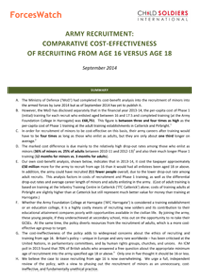 This paper, published by ForcesWatch and Child Soldiers International, shows that the taxpayer would save approximately £50 million per annum if the minimum age of recruitment were raised to 18; it would also result in the army needing to find about 211 fewer new recruits annually, based on current numbers joining the trained strength.
The paper concludes that the case to cease recruiting from age 16 is now overwhelming and urges a full, independent review of the policy, with a view to phasing out the recruitment of minors as an unnecessary, cost-ineffective, and fundamentally unethical practice.
This paper, published by ForcesWatch and Child Soldiers International, shows that the taxpayer would save approximately £50 million per annum if the minimum age of recruitment were raised to 18; it would also result in the army needing to find about 211 fewer new recruits annually, based on current numbers joining the trained strength.
The paper concludes that the case to cease recruiting from age 16 is now overwhelming and urges a full, independent review of the policy, with a view to phasing out the recruitment of minors as an unnecessary, cost-ineffective, and fundamentally unethical practice.
Engage: the Military and Young People
June 2014
A short film made by Headliners and ForcesWatch, 2014
Why does the military have a 'youth engagement' policy and why is the government promoting 'military ethos' within education? What is the impact of military activities taking place in schools? ForcesWatch have been working with the charity Headliners and a group of young people in London to produce this short film which explores these questions and gives teenagers the opportunity to voice their reaction to the military’s interest in their lives.Peace Education Network
 The Peace Education Network is a national UK network that brings together people and organisations committed to education for peace.
The Peace Education Network is a national UK network that brings together people and organisations committed to education for peace.
Teach Peace pack
revised 2016
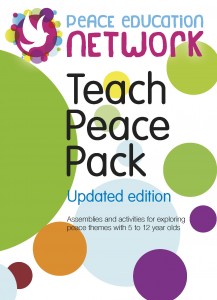 Teach Peace, a new resource from the Peace Education Network, is a set of eight assemblies, follow-up activities, resources, prayers and reflections on peace for primary schools.
From the UN peace day, 21 September, to the International Day for Children as Victims of War, 4 June, the school year is ?lled with opportunities to use the assemblies and activities in Teach Peace. This resource will help to ensure peace is a key theme in our children’s education and help you to celebrate peace and the peacemakers in your school.
The entire resource is free to download below. Hard copies of Teach Peace are available from the Peace Education Network for £5. Also available in Welsh.
Teach Peace, a new resource from the Peace Education Network, is a set of eight assemblies, follow-up activities, resources, prayers and reflections on peace for primary schools.
From the UN peace day, 21 September, to the International Day for Children as Victims of War, 4 June, the school year is ?lled with opportunities to use the assemblies and activities in Teach Peace. This resource will help to ensure peace is a key theme in our children’s education and help you to celebrate peace and the peacemakers in your school.
The entire resource is free to download below. Hard copies of Teach Peace are available from the Peace Education Network for £5. Also available in Welsh.
Presentations from the Militarisation in Everyday Life in the UK conference
November 2013
Camouflage Kids: How the military affects young people’s lives
November 2013
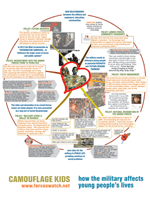 A ForcesWatch poster showing policy, cultural and other recent developments affecting the extent of military influence in young people's lives.
A ForcesWatch poster showing policy, cultural and other recent developments affecting the extent of military influence in young people's lives.
The Last Ambush? Aspects of mental health in the British armed forces
October 2013
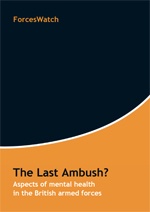 This report from ForcesWatch, shows that young soldiers recruited from disadvantaged backgrounds are substantially more likely than other troops to return from war experiencing problems with their mental health. It calls for the policy of recruiting from age 16 to be reviewed so that the greatest burden of risk is not left to the youngest, most vulnerable recruits to shoulder.
This report from ForcesWatch, shows that young soldiers recruited from disadvantaged backgrounds are substantially more likely than other troops to return from war experiencing problems with their mental health. It calls for the policy of recruiting from age 16 to be reviewed so that the greatest burden of risk is not left to the youngest, most vulnerable recruits to shoulder.
‘Catch them young before the army loses them’
2013
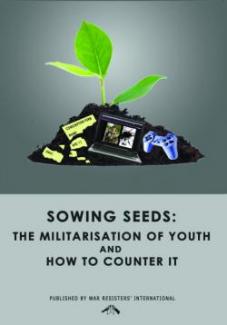 by David Gee in Sowing Seeds: The Militarisation of Youth and How to Counter It, War Resisters International, 2013
by David Gee in Sowing Seeds: The Militarisation of Youth and How to Counter It, War Resisters International, 2013
Young age at Army enlistment is associated with greater war zone risks: An analysis of British Army fatalities in Afghanistan
August 2013
This paper, published by ForcesWatch and Child Soldiers International, indicates that the risk of fatality in Afghanistan for British Army recruits aged 16 and completed training has been twice as high as it has for those enlisting at 18 or above.
One Step Forward: The case for ending recruitment of minors by the British armed forces
April 2013
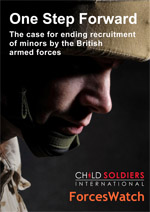 This report published by Child Soldiers International and ForcesWatch outlines the numerous ethical and legal concerns related to rhe recruitment of under-18s, including the disproportionately high level of risk they face and long-term consequences for their employability, as well as detailing how much more it costs than recruiting only adults.
This report published by Child Soldiers International and ForcesWatch outlines the numerous ethical and legal concerns related to rhe recruitment of under-18s, including the disproportionately high level of risk they face and long-term consequences for their employability, as well as detailing how much more it costs than recruiting only adults.
ForcesWatch briefing: Expanding the Cadets and ‘military ethos’ in UK schools
December 2012
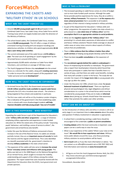 A ForcesWatch briefing on the Government policy of expanding cadets and promoting 'military skills and ethos' in schools.
A ForcesWatch briefing on the Government policy of expanding cadets and promoting 'military skills and ethos' in schools.
ForcesWatch briefing: Questioning the presence of armed forces in schools
May 2012
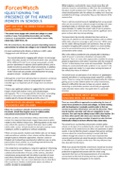 This ForcesWatch briefing is for parents, students and teachers concerned with military activities in their school.
This ForcesWatch briefing is for parents, students and teachers concerned with military activities in their school.
Informed Choice? Armed forces recruitment practice in the United Kingdom
November 2007
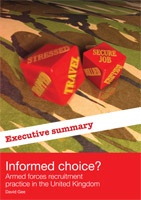 An independent report by David Gee, published in 2007, highlighting the risks posed to young people through joining the military, how young people from disadvantaged communities are targeted, how information available to potential recruits is often misleading and how the terms of service are complicated, confusing and severely restricting. The research found that a large proportion join for negative reasons, including the lack of civilian career options.
An independent report by David Gee, published in 2007, highlighting the risks posed to young people through joining the military, how young people from disadvantaged communities are targeted, how information available to potential recruits is often misleading and how the terms of service are complicated, confusing and severely restricting. The research found that a large proportion join for negative reasons, including the lack of civilian career options.
